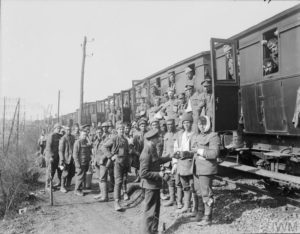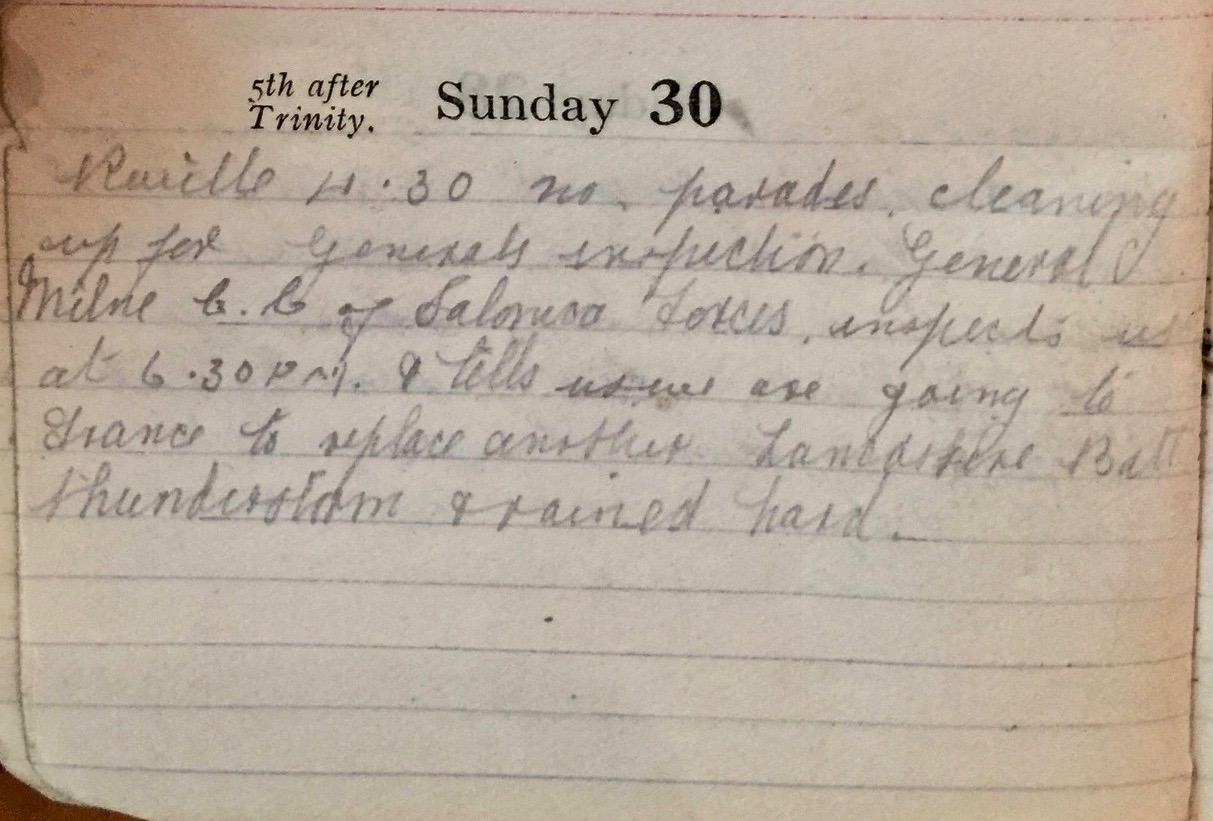Sunday June 30th, 1918
Reveille 4:30. No parades. Cleaning up for General’s inspection. General Milne, Commander in Chief of Salonika Forces inspects us at 6:30pm and tells us we are going to France to replace another Lancashire Battalion. Thunderstorm and rained hard.
Operation Order No. 40
A & C Companies will board the train at Sarigueul tomorrow and B & D will follow the next day. Captain Coyne, awarded the MC ribbon by General Milne today, will be the medical officer travelling with Frank and his comrades on the second train. He will have half the Battalion’s medical supplies with him and be supported by an Orderly.

The soldiers will be in Full Marching Order with packs, sun helmets and small box respirators. They will carry their steel helmets on their left shoulders and their blankets will be on their packs. Those who have had malaria in the past month will take 30 grains of quinine daily, all others will take 5 grains. The OC of each train will be held responsible for all officers and men taking this medicine as directed.
Orders for the Train are read out to all ranks before the trains depart. An NCO or senior soldier will be put in charge of each carriage and the men in it. There are clear expectations of the good conduct of the men. At the terminal stop, the train will be inspected and any damage will need to be explained.
The photograph shows wounded British soldiers stretching their legs beside their train which has stopped just outside Amiens in March 1918.
Soldiers Honoured
General Milne, the Commander in Chief of the British Salonika Force inspects and addresses the Battalion this evening. He also presents recent MC ribbons to various officers and other honours to NCO.
Sergeant McManus has been awarded the highly prized Meritorious Service Medal and Company Quartermaster Sergeant Hinde the Military Medal.
CQMS Robert Hinde was a pre-war regular with the 1st Battalion of the Manchester Regiment. He qualified for the 1914 Star² with the rest of the Battalion on 27.08.1914. He rose to the rank of Warrant Officer 2 and served with the 1st, 3rd and 13th Battalions of the Manchesters over his career.¹
Major Richard Montagu Lawrence Scott of the Cheshire Regiment was attached to the Manchester Regiment. He first served with the West Africa Regiment, joining in August 1914. He will remain in the Army until 1921.
Captain William Reginald Batty, Manchester Regiment, had first served in France in October 1915. He will stay in the Army until 1923.
Captain Eugene Henry Coyne of the RAMC was a surgeon. After the war he would practice in London.
These honours will be reported in the London Gazette of Monday June 3rd 1918 on pages 6505 & 6506, together with that of Lt Walter Foskett. Lt Foskett had joined the Army as a Private with the Warwick Yeomanry. Possibly he was both a temporary officer and gentleman. Foskett first saw active duty as a Private in Egypt in April 1915. He was commissioned in January 1916. He would serve also with the Corps of Hussars, the Manchester Regiment and the 74th Punjabi.
13th (Service) Battalion War Diary – 30th June 1918 – Sarigueul
D Coy & HQ Coy 2 hours Gas Parade. The C in C (General G Milne KCB DSO) inspected the Battalion at 18:30 hrs. Present MC ribbons to Major RML Scott, Capt WR Batty, Capt E Coyne RAMC. MM ribbon to CQMS Hinde B Coy and MSM ribbon to Sgt McManus, C Coy. Shook hands with all officers, wished the Battalion ‘Good Luck’ and said we were going to France to strengthen a Lancashire Division. Heavy rain came on and shortened the Inspection.
Operation Order No 40 (Appendix III) and Orders for Transport (Appendix IV) issued 19:00hrs.
Effective Strength Table attached (Appendix V). Health of Battalion during month of June:- An attack of Sandfly Fever incapacitated about 125 men for ten days at La Marraine Camp. Otherwise the health of the Battalion was excellent. There was very little malaria.
JFB Morrell, Lt Col, Commanding 13th (S) Bn Manchester Regiment
References & Further Reading
¹ Information on CQMS Hinde provided by Charlie of the Manchesters.org. Award of MM reported in the Edinburgh Gazette Jan 16,1918, p365.
² The 1914 Star, also known as the Mons Star, was awarded to members of the British Army who saw service on the Western Front between 5 August and 22 November 1914.
* Q 10795 copyright Imperial War Museums


